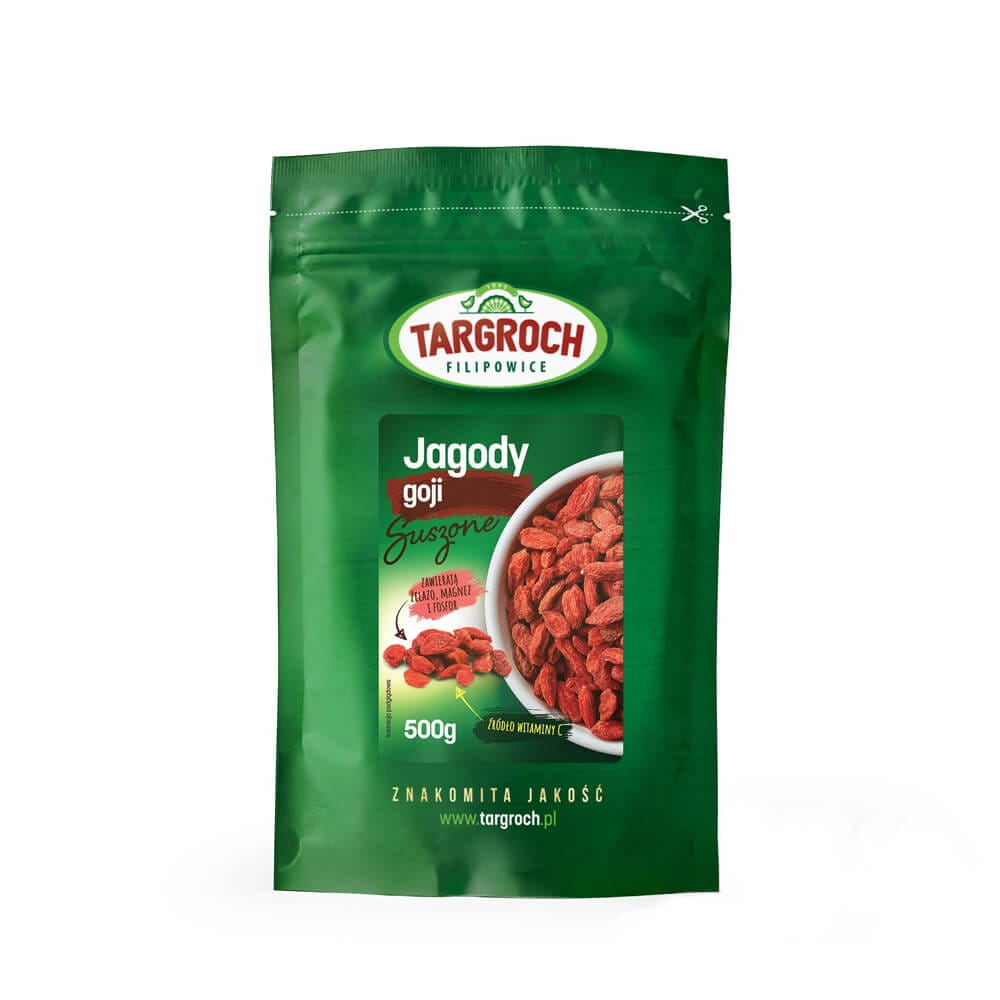Dried goji berries 500g TARGROCH
- Regular price
- €10,21
- Regular price
-
- Sale price
- €10,21
- Unit price
- per
Couldn't load pickup availability
Description
xDESCRIPTION
p>
-high dose of antioxidants
-contains carotenoids
-contains zinc, iron, calcium, copper, selenium, phosphorus
-this is a good source of B vitamins, vitamin C and E
-positively affects the organ of vision
The wolfberry bush is a plant that produces goji berries. Native to central China, it is now more popular and cultivated in many regions of the world such as Tibet and Mongolia. In China, these berries have been used for thousands of years. These berries are small red fruits about 2 cm in size. They can be eaten raw, but are most often dried. They are also used to make wine, teas and liqueurs. The taste is quite tart and in 100g they have 370 kcal. They are suitable as a separate snack or as an addition to sweet and savory dishes. Raw fruit can be boiled in water before consumption or added to soups, rice and sauces.
Goji berries contain carotenoids that give them their color and have a positive effect on skin condition. Also polysaccharides, essential oils and fatty acids such as hexadecanoic acid, linoleic acid and myrstinic acid. They contain such organic acids as malic acid, citric acid, shikimic acid and fumaric acid. They can enrich our diet with minerals such as zinc, iron, calcium, copper, selenium and phosphorus. They contain B vitamins, vitamins C and E. Thanks to the presence of polysaccharides and polyphenols, they have antioxidant properties, that is, they fight free radicals in our body. These tiny fruits are a treasure trove of nutritional values that have a positive effect on the skin, rejuvenate it and support our immunity.
It is also worth mentioning their positive effect on eyesight. This is due to the carotenoid content, specifically zeaxanthin, which makes up the bulk of it, and lutein. Together, these protect the retina of the eye from damage that can result from free radicals. Lutein protects our eyes from the harmful effects of light and UV radiation by absorbing visible blue light.
INTERESTING
According to a Chinese legend, the human who regularly consumed goji berries and led to their popularization lived up to 252 years.
These fruits should not be eaten when they are still unripe. This can lead to digestive problems.
INGREDIENTS
goji berries.
APPLICATION
Goji berries can be eaten dried. They are perfect as an addition to desserts, yoghurts, muesli as well as vegetable dishes and soups.
| nutritional value of the product | in 100g |
| calorific value | 1657/396 calories |
| Fat | 4.2g |
| - including saturated fatty acids | 0.8g |
| carbohydrates | 22.3g |
| -w including sugar td> | 11.1g |
| fiber | 6.2g |
| protein | 10.6g |
| Salt | 0.06g |
similar products
- Regular price
- €10,21
- Regular price
-
- Sale price
- €10,21
- Unit price
- per
- Regular price
- €10,21
- Regular price
-
- Sale price
- €10,21
- Unit price
- per
- Regular price
- €10,21
- Regular price
-
- Sale price
- €10,21
- Unit price
- per
- Regular price
- €10,21
- Regular price
-
- Sale price
- €10,21
- Unit price
- per
- Regular price
- €10,21
- Regular price
-
- Sale price
- €10,21
- Unit price
- per
- Regular price
- €10,21
- Regular price
-
- Sale price
- €10,21
- Unit price
- per
- Regular price
- €10,21
- Regular price
-
- Sale price
- €10,21
- Unit price
- per
- Regular price
- €10,21
- Regular price
-
- Sale price
- €10,21
- Unit price
- per
- Regular price
- €10,21
- Regular price
-
- Sale price
- €10,21
- Unit price
- per
- Regular price
- €10,21
- Regular price
-
- Sale price
- €10,21
- Unit price
- per
Recently Viewed Products
- Regular price
- €10,21
- Regular price
-
- Sale price
- €10,21
- Unit price
- per
- Regular price
- €10,21
- Regular price
-
- Sale price
- €10,21
- Unit price
- per
- Regular price
- €10,21
- Regular price
-
- Sale price
- €10,21
- Unit price
- per
- Regular price
- €10,21
- Regular price
-
- Sale price
- €10,21
- Unit price
- per
- Regular price
- €10,21
- Regular price
-
- Sale price
- €10,21
- Unit price
- per
- Regular price
- €10,21
- Regular price
-
- Sale price
- €10,21
- Unit price
- per
- Regular price
- €10,21
- Regular price
-
- Sale price
- €10,21
- Unit price
- per
- Regular price
- €10,21
- Regular price
-
- Sale price
- €10,21
- Unit price
- per
- Regular price
- €10,21
- Regular price
-
- Sale price
- €10,21
- Unit price
- per
- Regular price
- €10,21
- Regular price
-
- Sale price
- €10,21
- Unit price
- per
- Choosing a selection results in a full page refresh.











